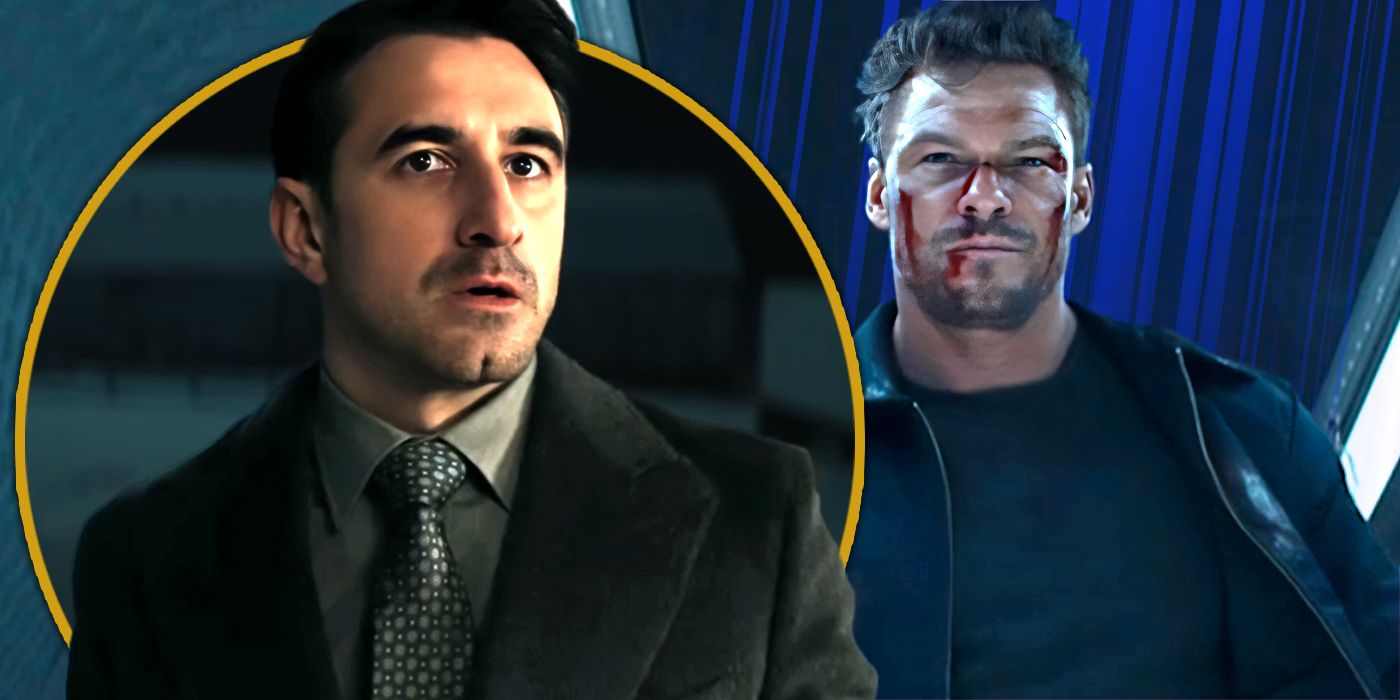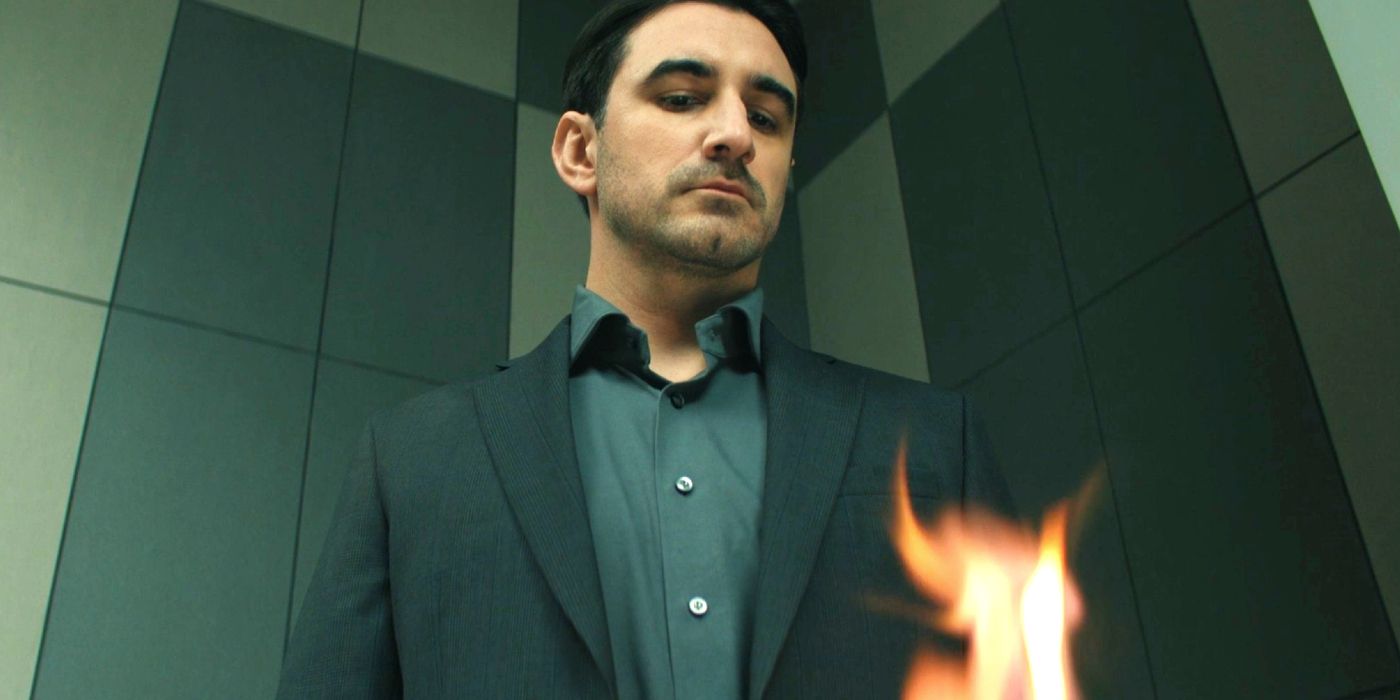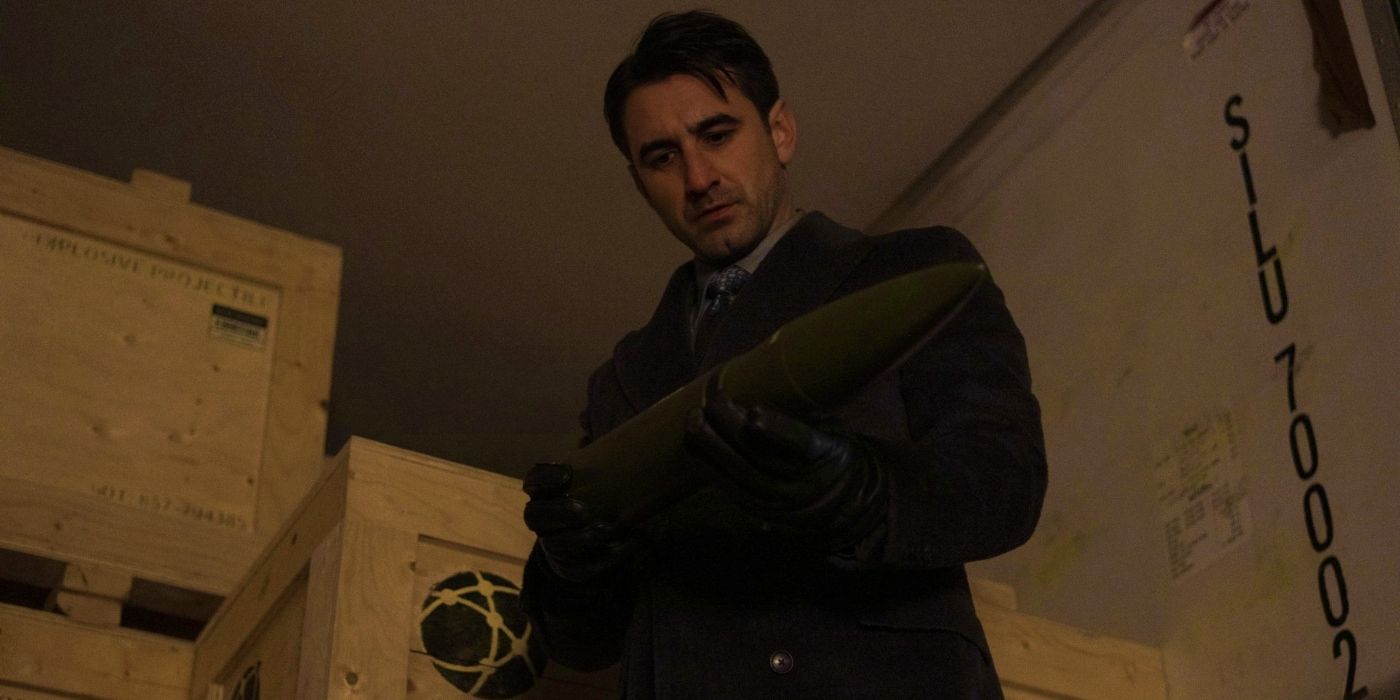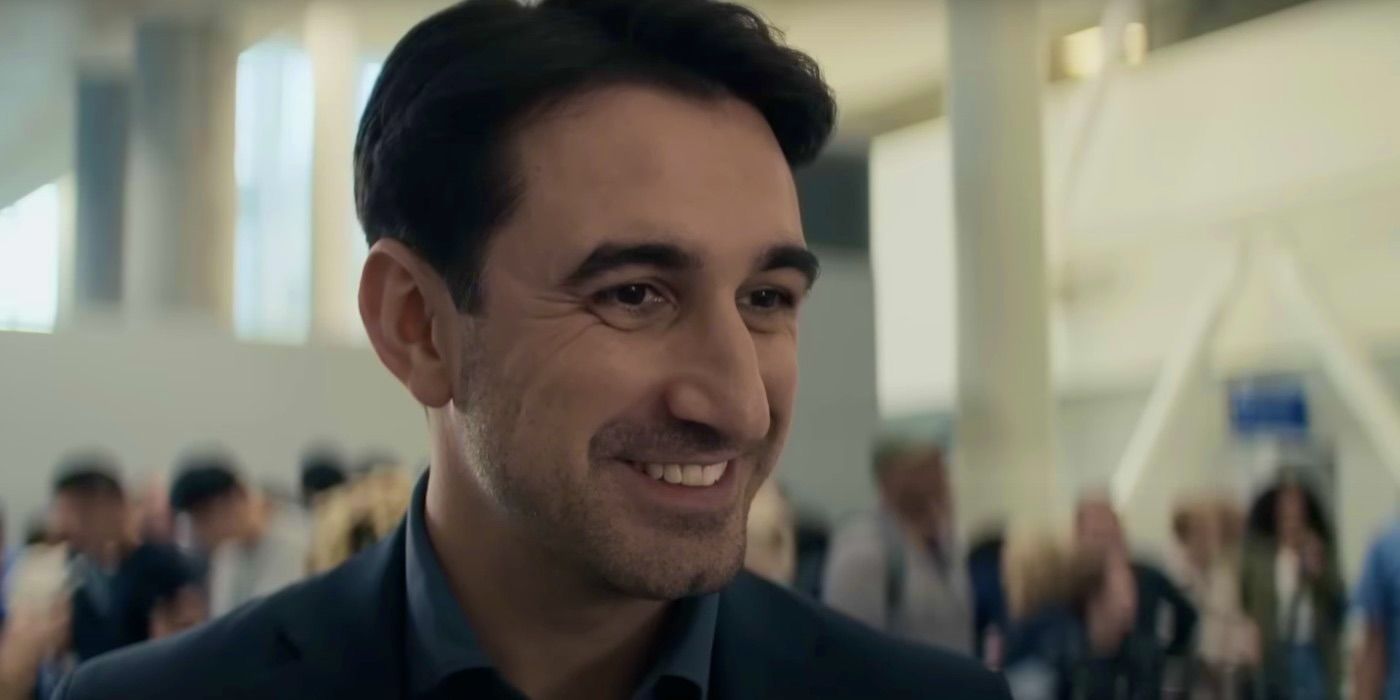Screen Rant interviews Reacher season 2 star Ferdinand Kingsley to discuss his role as the ruthless & mysterious villain A.M. in the Prime Video show.

SUMMARY
Villain A.M., portrayed by Ferdinand Kingsley, is a dangerous arms dealer and misanthrope in Reacher season 2.
The show strikes a balance between light and dark tones, with A.M. serving as a contrast to the warmth and magnetism of the titular hero.
Kingsley’s portrayal of A.M. involved maintaining intrigue and charisma while being a complete opposite to Reacher, leading to a solitary journey until the final episodes.
Jack is back for Reacher season 2 on Prime Video, and this time he’s up against a dangerous villain, a mysterious misanthrope known only by the initials, A.M. Played by Ferdinand Kingsley, A.M. has a single-minded devotion to his mission, and doesn’t care how many innocent people need to die for him to get his paycheck. Naturally, this puts him on a crash course with Reacher and his squad, the surviving members of the (officially disbanded) 110th MP Special Investigations Unit.
Actor Ferdinand Kingsley might be best known to audiences for his performance in David Fincher’s 2020 Hollywood biopic, Mank, though he’s also stolen scenes in such shows as The Sandman, Still Star-Crossed, and Silo. He’s also the son of Ben Kingsley and Alison Sutcliffe, so a proclivity towards the craft of acting is clearly in his blood as he steadily makes a name for himself in the industry.
Warning: Some SPOILERS lie ahead for Reacher season 2!
In honor of the finale, Screen Rant interviewed Ferdinand Kingsley to discuss the Reacher season 2 ending, knowing more of A.M.’s motivations than the show actually revealed and getting to be the star of his own odyssey before crossing paths with the titular hero and his friends.
Ferdinand Kingsley On Pragmatic Misanthropy of Reacher Season 2’s A.M.

Screen Rant: I’ve been stewing over A.M. Your character is this misanthropic guy who represents extreme capitalism, or capitalism amok.
Ferdinand Kingsley: There’s a lot of stewing to be done around a character who, by design, gives you very little, right?
Ferdinand Kingsley: I think that’s a really good question, because there’s a twinkle in the eye of the show, isn’t there? Otherwise, it’s just too relentless and ruthless, which Reacher, the man, is, but the show needs light as well as darkness.
Otherwise, it’s just too much to take. So I think there’s a bit of a balancing act, because with a character like mine, you can’t waste energy trying to make him too likable to the audience, but you also need to have enough going on, enough interest.
I don’t want to say “likability,” but intrigue or charisma or whatever the word is that keeps us wanting to come back and ask more questions about him, rather than just go, “Bad guy: can’t wait for you to be not in this anymore, bye bye!”
I think the actor’s balancing act is to find the light notes, the jokes, but making sure that it’s not undermining the material or sending the material up. Because we have to remember, this is a man who will, with a smile and a wink, and half of a one-liner, he’ll bleed you out in a matter of seconds!
So yeah. Also, I’m there to offer some contrast. I’m sort of a shadow to Reacher, in a way. There’s a real Manichean, is a good word that I learned from my partner, there’s a real Manichean sense of good and evil. It’s a real light and dark show, and Reacher has the warmth and magnetism. I get to enjoy being the complete, diametric opposite of that.
I was thinking about how much time the show spends on just you. There’s Reacher and his gang, and there’s you on your solo story, and the viewer doesn’t really know where it’s going for quite a while. Robert Patrick is this go-between, but it’s really not until the last episode or two where you really intersect with Reacher’s story.
Ferdinand Kingsley: It feels like there’s a certain gravitational pull between us. You know from the moment that I emerge as the character, I am, in some way, going to be drawn to him, and him to me. There’s an inevitability to that. But it’s also a solitary journey.
Most of the actors that I was doing scenes with, if I asked, “When are you next in?” They’d go, “Obviously it’s my last day because you kill me!” So a lot of the journey was spent on my own. I didn’t actually get to hang out with most of the gang until the final episode! Reacher is just a bit more of an unstoppable force than I am. (Laughs)
Part of it is because he’s got his friends, the squad!
Ferdinand Kingsley: He’s got his pals! Yeah. It’s a really nice contrast with season 1 in that I’m very much on a lonesome journey, by design. He’s on a lonesome journey because that’s built into his bones.
I think there’s something interesting about two loners, one of whom decides to let other people in, and the other of whom entirely functions on his own and will never allow anyone close to him. My commiserations to any actor who has to share a scene with him, because they end up dead!

In terms of shooting, did it feel like you were shooting your own movie, this little odyssey? Because you don’t have any scenes with any of the other leads. You’re top of the call sheet in your scenes!
Ferdinand Kingsley: (Laughs) Yeah, it was strange, but actually, in a weird way, kind of useful. Socially, I was sort of going, “Oh, I wish I got to hang out with and work with this core group of brilliant actors more than I do,” of course, but there was something useful about the fact that none of us really knew one another. I got to hang out with Serinda a little bit because I was in Toronto on my own, and she lived around the corner, so we got to say “hi” about twice over the course of four months.
But Alan and I didn’t get to meet at all until our showdown. So there was something quite dramatically useful about the two of us, especially since he spends the series talking about me and wondering what I’m going to be like, and not actually knowing what I’m going to be like at all. I had the benefit of having seen him do an entire season in the leadup! And I can only presume that he’s watched my entire ouvre.
Naturally!
Ferdinand Kingsley: Every nanosecond of screen time I’ve ever had in everything I’ve ever been in, you know, because I’m irresistible in that regard! (Laughs) But no, it was quite cool, coming into the final showdown on a night shoot, where it was minus 42 degrees or something like that, and just sort of walking into the same room while we were having layers of thermals attached to us, and bulletproof vests, and going, “Yeah, I feel like I’ve been waiting for this for the past few months!”
A.M. is this mysterious guy. His true identity, we never get to find out, he’s like a capitalist version of The Joker. Did you have a true backstory for the character that you drew on, or did you do it as a mystery?
Ferdinand Kingsley: I think the actor has to. It’s that old thing that actors say, “What you see on screen or on stage, hopefully, is the tip of the iceberg. And the rest of the iceberg is under the water.”
That’s the hope. So I knew where and when he was born. I know what happened to his parents. I know how he ended up being in Britain. I know who the first person he killed was. But the viewer doesn’t need to know.
But I did, just for my own sanity, and to feel like there’s — acting is always more fun if you’re not just standing and speaking. We want to see people thinking or pushing thoughts down that they don’t want to think, if you know what I mean.
The show enjoys or makes a point of the fact that we never know who he really is. We never know his true name. And I didn’t feel the need to play the backstory, if that makes sense.

He’s where he is.
Ferdinand Kingsley: Yeah, he is where he is now, and I think that’s very much part of what makes him able to do what he is capable of doing and what he chooses to do. It goes beyond compartmentalizing.
He is sort of a very sleek, refined, friction-free freight train. Or a bullet train, really, with no stops. He has his mission, like Reacher has his mission, and he can shut everything else out. There’s always a temptation as an actor to go, “Actually, I have ten secrets about this character that I’m going to start telegraphing a little bit,” but that’s for the rehearsal room.
That’s for me while preparing in my little flat in Toronto. There’s something joyous about a show like Reacher. It’s so confident in knowing what it’s doing, in its style and execution. It says, “No, actually, we’re going to enjoy not giving you the Wikipedia page on this character.
You can project onto him what you want. You can project your fears or your prejudices or your assumptions about a terrorist or a businessman, as he’d call himself.” And if we take the time to think about it, there’s something quite revealing about what we want to project onto a bad guy, whether that be motivation, whether that be ethnicity…
And he’s ambiguous on all counts.
Ferdinand Kingsley: Yeah! And we, the viewer, I think it’s interesting what assumptions we make. “Oh, he’s this kind of bad guy.” And when it comes down to it, Jack Reacher doesn’t care.
Otherwise, there would be a more nuanced conversation between us than there ends up being. Reacher states his intentions and then goes about seeing them through, just as A.M. does.
The character is such a crux. The whole show, in talking to you now, feels like it wouldn’t work if it wasn’t you, if it wasn’t someone who cared that much about his journey.
Ferdinand Kingsley: Well, thank you very much, that’s really kind of you. I think the lesson for me, the actor, is that in a show that is as well put together and confident as Reacher, there’s fun in knowing exactly what you want to deliver on screen and the purpose the character needs to serve in the story. And then having the foundations of the homework that you’ve done underneath it. Even if it only adds that extra one percent, you know you’re doing your job.
Is there a project you’ve done that you’re particularly proud of, work-wise, that you feel maybe didn’t get the eyes that it deserved on it? Something you want to shout out for the Screen Rant audience, now that people are watching Reacher, if people want to see more of you, what would you have them see?
Ferdinand Kingsley: Oh, that’s really interesting. I think that I’ve had a really lucky past few years. Each of the last four jobs that I’ve done has been the antidote to the one before it, if you know what I mean. What we all desperately dream of in this job is that no two jobs, one after the other, are the same job.
I actually felt really proud of the things that I’ve done in the past few years. Hmm, this is hardly something that went under the radar, but this is something that really reminded me of why I love what I do so much, and that was… There’s this young, up-and-coming director called David Fincher, I don’t know if you’ve heard of him.
I did a film for him just before lockdown, called Mank. It was just one of those jobs that injected enthusiasm and life back into me, exactly when I needed it. I was just feeling a little bit low in confidence, or low in the belief that I might be the kind of person that one of my filmmaking heroes would take a punt on.
What I realized was that sometimes you just need to solve a problem for a director. For all the jobs that we don’t get, that’s not a comment on our talent or our ability to add something to the creative process. It’s just that 99% of the time, most actors, no matter how good they are, aren’t ticking the particular criteria that’s required for a certain production.
And that’s beyond our control. When one comes along, if you’re lucky enough, and you have people who’ve got your back and who are willing to give you time and trust, then a filmmaker whose craft you are obsessed with, as I have been David Fincher, will come along and quite simply go, “Yeah, he’s the solution to a problem I have.
This character needs these qualities.” And it can feel kind of painless. And then you get to go work on a film with a lot of your heroes, and you work your tiny little bottom off, and you end every day tired and exhilarated and feeling like, yeah, I made the right choice to be doing this job.
I wouldn’t say it’s a project that went under the radar at all, but I think it’s really important to say when we are thankful for things that come along when you’re in the right place at the right time.
Do you think that if you hadn’t gotten Mank, you wouldn’t be here now, talking to me? Would you have turned it in and gotten “a real job“?
Ferdinand Kingsley: No, I wouldn’t have stopped acting. But it was exactly the right job for then. I was feeling like I really was desperate to go and work hard and to be challenged. I think most of us are.
Most of us, given the opportunity, want to work hard. To answer your question, would I be here, talking to you now? Probably not, because I think that job led to other jobs, which led to other jobs. Not in immediate ways, but in ways that trickled down over the course of two or three years, and that’s really a lovely feeling.
About Reacher Season 2
Reacher Season Two begins when veteran military police investigator Jack Reacher (Alan Ritchson) receives a coded message that the members of his former U.S. Army unit, the 110th MP Special Investigations, are being mysteriously and brutally murdered one by one. Pulled from his drifter lifestyle, Reacher reunites with three of his former teammates turned chosen family to investigate.
Based on Bad Luck and Trouble, the 11th book in Lee Child’s global best-selling series, Reacher Season Two stars Alan Ritchson in the title role of Jack Reacher, with Maria Sten, Serinda Swan, and Shaun Sipos as key members of the 110th MP Special Investigations Unit.